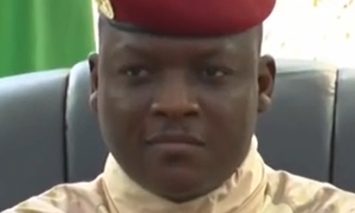By ESS Donli
In 2022 Captain Ibrahim Traoré seized power in Burkina Faso by overthrowing the previous junta leader Paul-Henri Damiba. The Captain had promised a 12-month transition to civilian rule, but he has so far extended his junta’s rule to five years, citing security crises.
Silencing Opposition
This prolonged military control has led to severe human rights abuses, including forced conscription of critics into combat units as punishment. Reports have emerged of dissenters being forcibly disappeared after being sent to the front lines, with only a few bodies recovered. In one anecdote, a teacher reported to have criticized Traoré on Facebook was forcibly removed from their classroom in Ouagadougou by soldiers, and their mother received a photograph showing them in military uniform at the Mali border, accompanied by a threatening message: “Your son now serves Burkina. Stop talking or he serves forever.”
This chilling example illustrates the regime’s tactics to silence opposition and instill fear among the population, creating a climate of self-censorship and repression. The inherent nature of military institutions, structured for combat rather than governance, lends itself to such abuses. Without the checks and balances that exist in democratic systems, military governments often prioritize discipline and control over accountability and human rights, inevitably leading to mismanagement and repression. Military rule is inherently prone to authoritarianism, lacking the institutional safeguards that protect citizens’ rights and promote transparency in governance.
Targeting the media
Burkina Faso’s government has cracked down on media freedom, suspending TV5 Monde in June 2024 and imposing a fine of 50 million CFA Francs, equivalent to €75,000, for hosting government critic Newton Ahmed Barry. Other news outlets, such as the Guardian, DW, BBC, Voice of America, and L’Événement, have faced similar repression and threats. Thirty internationally renowned media organizations, including Reporters Without Borders (RSF), have signed an open letter condemning the junta as a “regime of terror”, with Human Rights Watch also criticizing the crackdowns.
Journalists have been targeted, with some facing severe reprisals. Serge Atiana Oulon, Adama Bayala, and Kalifara Sere disappeared in 2024 and were later found to have been conscripted into the military, echoing similar tactics used to intimidate journalists like Idrissa Barry, Guezouma Sanogo, and Boukari Ouoba. Radio Oméga was shut down indefinitely after airing testimony on a civilian massacre, and its director, Alpha Barry, found a grenade at his gate after being targeted by regime-aligned influencers.
Journalist Hyacinthe Sanou was attacked and labeled a French spy. In March 2025, the Association des Journalistes du Burkina (AJB) was dissolved, following the arrest of its president and vice-president, further stifling press freedom, with the government often citing national security concerns to justify its media crackdowns.
The crackdown on media and journalists paints a stark picture of life under Traoré’s regime, where dissent is met with brutal repression.
Nigeria and Burkina Faso
The contrast between Nigeria and Burkina Faso’s media landscapes is striking. While Nigeria’s press remains relatively free to critique President Tinubu’s administration, despite some critics labeling him a tyrant, Burkina Faso’s media faces severe repression under Captain Ibrahim’s rule. Notably, even Tinubu’s critics acknowledge that Nigeria’s democratic systems, though imperfect, has prevented the kind of draconian measures IB has taken to silence dissent. Unlike Traoré’s regime, which has amended the penal code to criminalize reporting on military operations and invoked national security to justify censorship, Nigeria’s media can expose high-profile controversies without facing reprisal.
Burkina Faso’s ranking in the Reporters Without Borders press freedom index has significantly declined under the regime, dropping to 105th from 58th. This highlights the concerning level of media repression in Burkina Faso and underscores the importance of democratic institutions in protecting press freedom and preventing authoritarianism. Even with its flaws, Nigeria’s democratic system has allowed for a range of opinions and critiques, demonstrating the value of institutional checks on power.


